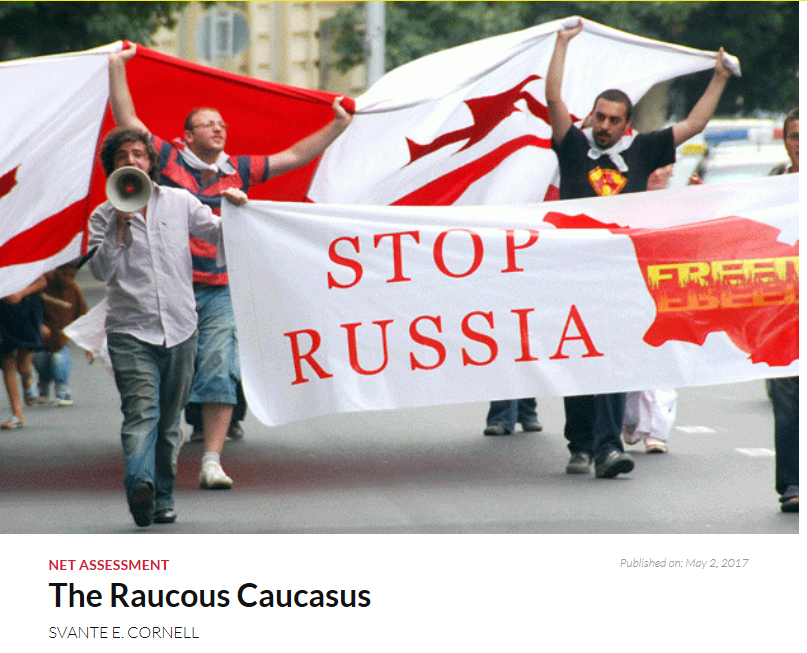[Video Posted] CACI Online Forum: What the South Caucasus Should Expect from the Biden Administration
What the South Caucasus Should Expect from the Biden Administration
The Biden administration inherited a decade-long uncertainty in US policy towards the South Caucasus. What should the countries of the region expect from the new American administration, in the context of the rapidly changing geopolitical environment in and around the South Caucasus? Should we expect more US engagement or less? Should we expect more security cooperation or less? What about democracy promotion? How will the US policy towards Iran, Turkey, and Russia impact the region?
Our panel of speakers with in-depth knowledge of the Washington policy-making landscape answered these question and more.
Speakers:
Jason Bruder, Former Foreign Relations Committee Staffer and Senior Advisor at Open World
Scott Cullinane, Executive Director, US-Europe Alliance
Claire Kaiser, Director for Strategic Initiatives, McLarty Associates
Mark Simakovsky, Nonresident Senior Fellow, Atlantic Council
Moderator: Svante E. Cornell, Director, Central Asia-Caucasus Institute
When: Tuesday, February 16, 2021, 12:00-1:15 pm EST
The event was livestreamed on the CACI Facebook page and is now available on YouTube.
CACI Event Invitation: China's Belt Road Initiative in Eurasia: The Challenge of Fostering Sustainable Connectivity
China's Belt Road Initiative in Eurasia: The Challenge of Fostering Sustainable Connectivity
Co-sponsored by the Davis Center for Russian and Eurasian Studies and the Fairbanks Center for Chinese Studies at Harvard; and the Mossavar-Rahmani Center for Business and Government; and the Central Asia-Caucasus Institute at the the American Foreign Policy Council
Since its official launch in 2013, China's Belt and Road Initiative (BRI) has become a topic of intense research and and discussion. While there is no shortage of research projects on the features and implications of Beijing's massive investments in infrastructure connecting Asia with Europe and Africa, our understanding of linkages between China's activities in various geographic regions and emerging interdependencies is limited. This roundtable will gather experts on Chinese investments and policies in Europe, the South Caucasus and Central Asia (the Silk Road region of the BRI) to present a more comprehensive picture of Chinese-designed connectivity in Eurasia.
Roundtable participants will discuss the current responses by policy makers in the EU, the South Caucasus, Central Asia and the US to the BRI and the changing realities that it is producing. They will also propose their visions of what is desirable and feasible, taking into consideration the opinions of American and European officials regarding the importance of environmental standards and the need for a level-playing field for companies. The European Commission recently published the Joint Communication "Connecting Europe and Asia – Building Blocks for an EU Strategy" explaining its own approach to connectivity as sustainable, comprehensive and rules-based and enlisting its plans for raising investment to foster such sustainable connectivity. This promises to be a tall order--what role can (or should) the US play?
Philippe Le Corre is a Senior Fellow at the Mossavar-Rahmani Center for Business and Government at the Harvard Kennedy School. He is also a nonresident Senior Fellow with the Carnegie Endowment for International Peace and Associate with the Fairbank Center for Chinese Studies at Harvard. He was previously a Fellow with the Brookings Institution in Washington, and a Special Assistant for International Affairs to the French Minister of Defense. For the past five years, he has specialized on China-Europe relations, Chinese overseas investments and China's foreign policy, authoring many articles and reports, including the newly published "China as a Geoeconomic Influencer: Four Case Studies" (Carnegie Paper, 2018). His latest book, China's Offensive in Europe, was published by Brookings Press in 2016.
Mamuka Tsereteli is a Senior Fellow with the Central Asia-Caucasus Institute, part of the American Foreign Policy Council, based in Washington DC. He is a Senior Adjunct Professorial Lecturer at School of International Service at American University. He served as a Director, Center for Black Sea-Caspian Studies at AU between 2009-2013, and as an Assistant Professor at School of International Service in 2007-2011. Dr. Tsereteli is a member of the part time faculty at Johns Hopkins SAIS. His areas of interests include international relations and international economic policy, economic and energy security, political and economic risk analysis and mitigation strategies, and business development. Dr. Tsereteli previously served as Founding Executive Director at the America-Georgia Business Council, and Economic Counselor at the Embassy of Georgia in Washington, covering relationships with international financial institutions, US assistance programs and business initiatives.
Nargis Kassenova is a Senior Fellow at the Davis Center for Russian and Eurasian Studies, Harvard University, where she leads the Program on Central Asia. She is an Associate Professor at the Department of International Relations and Regional Studies of KIMEP University based in Almaty (Kazakhstan) where she launched both the KIMEP Central Asian Studies Center (CASC) and China and Central Asia Studies Center (CCASC). Her areas of research include Central Asian politics and security, Eurasian geopolitics, Kazakhstan's foreign policy, and religion and politics in Central Asia.
Svante E. Cornell is the Director of the Central Asia-Caucasus Institute & Silk Road Studies Program Joint Center, and a co-founder of the Institute for Security and Development Policy, Stockholm. His main areas of expertise are security issues, state-building, and transnational crime in Southwest and Central Asia, with a specific focus on the Caucasus and Turkey. He is the Editor of the Central Asia-Caucasus Analyst, the Joint Center's bi-weekly publication, and of the Joint Center's Silk Road Papers series of occasional papers. Cornell is Senior Fellow for Eurasia at the American Foreign Policy Council. He is a member of the Swedish Royal Academy of Military Science, and a Research Associate with the W. Martens Center for European Studies in Brussels. He is a Senior Fellow with the American Foreign Policy Council and an Associate Research Professor at the Johns Hopkins University's School of Advanced International Studies. Formerly, Cornell served as Associate Professor of Government at Uppsala University.
Speakers:
Philippe Le Corre, Mossavar-Rahmani Center for Business and Government, Harvard Kennedy School
Mamuka Tsereteli, Senior Fellow, Central Asia-Caucasus Institute at the American Foreign Policy Council
Nargis Kassenova, Davis Center for Russian and Eurasian Studies, Harvard University
Moderator: Svante E. Cornell, Director, Central Asia-Caucasus Institute at the American Foreign Policy Council
Where: CGIS South Building, 1730 Cambridge Street, Room S354, Cambridge, Massachusetts 02138
When: Tuesday, October 30, 2018 from 2:00 - 4:00 pm
RSVP: Click HERE to register
More Details: Please call 617-495-4037.
The U.S. and Security in the South Caucasus: Old Wounds, New Dynamics Roundtable Event Summary Online
The U.S. and Security Challenges in the South Caucasus Roundtable
Event Summary by Hayden Gilmore
On September 14, 2018, the Central Asia-Caucasus Institute hosted an off-the-record
roundtable discussion on U.S. Security Challenges in the South Caucasus. Speakers at the event
included Former U.S. Ambassador to Azerbaijan Robert Cekuta, Senior Director at Penn Biden
Center for Diplomacy and International Engagement Dr. Michael Carpenter, and American
Foreign Policy Council Senior Fellow Dr. Stephen Blank. CACI Director Svante Cornell moderated
the event.
The roundtable started with a discussion on changing variables within the region. The
speakers acknowledged key issues currently affecting U.S. relationships with the states of the
Caucasus and major players outside of the region. These issues include a lack of U.S. policy
focus in the region, the loss of Turkey as a model for states in the Caucasus and Central Asia,
political leadership that is fearful of a resurgent Russia and Iran, and the influence of China’s
Belt and Road Initiative in the region. The participants agreed that the U.S. should respond now
rather than later as a loss of influence, business operations, and spreading corruption all affect
U.S. relationships with countries in the South Caucasus.
One participant argued that the U.S. needs to be more involved in the region and utilize
opportunities with countries willing to accept and welcome U.S. involvement. The example of
Georgia and its territorial defense program was mentioned in this context. It was suggested
that the U.S. should help redesign the national security of the Georgian executive branch, as
well as present new military and tactical ideas, such as using the terrain to the Georgian
advantage. The restructuring could have a major impact with minimal U.S. resources.
Another key issue discussed was the relationship with Azerbaijan. There is a potential to
improve relations with the U.S. by means of security cooperation, particularly maritime
security. The previous administration was distracted from the region, and both Azerbaijan and
Armenia now need reasons to place trust back in the U.S.
The topic of Black Sea Security was raised, and the roundtable agreed on the necessity
of increased security in the Black Sea. One participant discussed increasing NATO presence and
maritime domain presence. However, Russia could consider these actions as provocative. Still,
the importance of the Black Sea to European allies was noted, as was the close link between
European security and Caucasus security. Concerning the Black Sea, it was noted that a
Romanian port is needed as there are currently only land forces in the area and the naval base
in Rota, Spain is too distant. Maritime presence in the area would act as power projection.
Two important opportunities for the U.S. to take advantage of were noted: the first is the 2018
Armenian Revolution, and the second is the Caspian Convention. Focusing on the importance of
the Caspian Convention, the argument is that this agreement lays the groundwork for a
possible gas pipeline to Europe, enhances Azerbaijani importance to Turkey, and causes the
South Caucasus to have more strategic importance as an energy provider to Europe in the long
run. It was noted that Russia continues to play Armenia against Azerbaijan to prevent
democratic values from reaching Armenia. This will stall democracy and prevent the gas
pipeline from materializing. To prevent this scenario, the U.S. must provide support and
convince Armenia that sustaining the conflict with Azerbaijan is counterproductive to its own
interests, and the U.S. should ramp up its role in the conflict resolution process. This would
entail committing U.S. resources as incentives towards economic revitalization to encourage
peace.
During a discussion of the prospect of energy pipelines across the Caspian, a note of caution
was issued: the U.S. has been against the Nord Stream 2 pipeline and for the Southern Gas
Corridor. Delays to construction through Italy though, could lead to a situation where Nord Stream 2 is built while the Trans-Adriatic pipeline, part of the SGC, falters. This would reduce U.S. credibility, and thus, before attempting to build Trans-Caspian pipelines, the U.S. should ensure the TAP pipeline is successfully constructed.
The Raucous Caucasus
Article, The American Interest, May 2, 2017
Svante E. Cornell,
The United States must restore its leverage and credibility in the restive region caught between Russia, Turkey, and Ira





